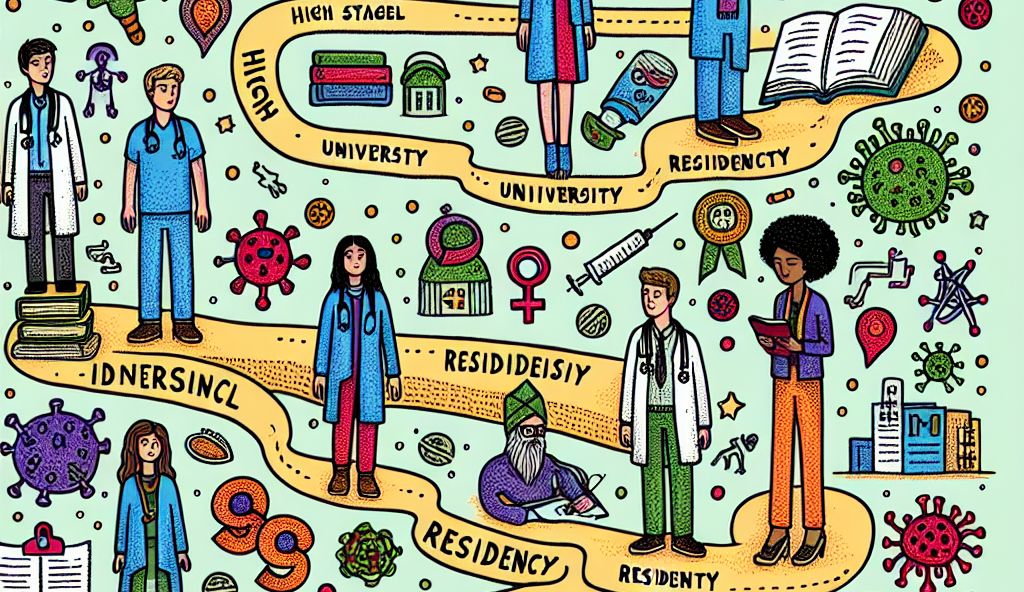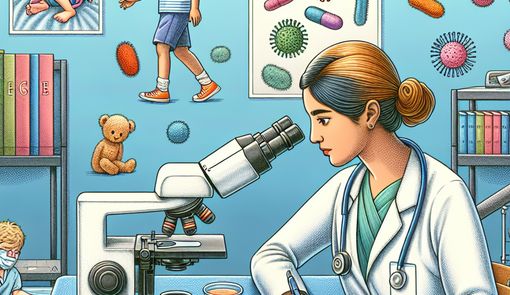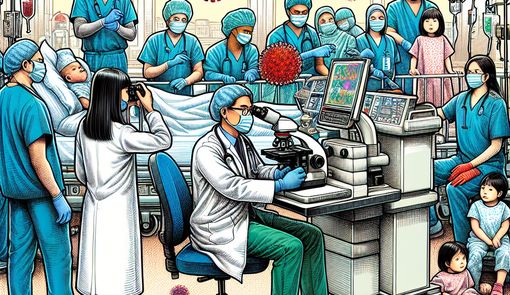Charting the Education Pathway for Aspiring Pediatric Infectious Disease Specialists

Pediatric infectious disease specialists are crucial members of the medical field, focusing on the diagnosis, treatment, and prevention of infections in children. Their role is vital, given the unique challenges infections pose to the developing immune systems of infants, children, and adolescents. Charting the pathway to a career in this specialized area requires a deep understanding of the educational and training journey one must undertake. In this article, we will provide a step-by-step guide to the educational requirements for aspiring pediatric infectious disease specialists.
Undergraduate Education
The journey to becoming a pediatric infectious disease specialist begins with a solid undergraduate education. Most medical schools require applicants to have a bachelor’s degree. While no specific major is mandated, candidates often benefit from concentrating their studies on science-related fields such as biology, chemistry, or biochemistry. It is important for undergraduates to strive for academic excellence and to take courses that medical schools consider prerequisites, such as organic chemistry, general chemistry, biology, physics, and mathematics.
Additionally, gaining early exposure to the healthcare field can be invaluable. Volunteering at hospitals or clinics, participating in research projects, or shadowing physicians are excellent ways to gain insight into the demands of the medical profession.
Medical College Admission Test (MCAT)
After completing an undergraduate degree, the next step is to take the MCAT. This standardized test assesses a candidate's knowledge of the natural, behavioral, and social science principles necessary for the practice of medicine. A high score on the MCAT is required to gain entrance into a reputable medical school. Candidates should invest significant time in preparing for this exam, which includes critical thinking, verbal reasoning, and writing skills in addition to the scientific knowledge.
Medical School
Admission to medical school is highly competitive, and a strong MCAT score is just one component of a successful application. Medical school typically lasts four years and is divided into preclinical and clinical phases. The first two years (preclinical) are classroom-based and cover the fundamentals of anatomy, physiology, pathology, pharmacology, and medical ethics. In the clinical phase, students rotate through different specialties, such as surgery, internal medicine, and pediatrics, gaining hands-on experience in treating patients.
Pediatrics Residency
Upon earning a Doctor of Medicine (MD) or Doctor of Osteopathic Medicine (DO) degree, graduates must then complete a residency program in pediatrics. Pediatric residency programs typically last three years and are designed to provide comprehensive training in child healthcare. Residents work under the supervision of experienced physicians and are responsible for a variety of tasks ranging from patient care to administrative duties.
During this period, residents should demonstrate competence in pediatric medicine and express a growing interest in infectious diseases. They can often tailor their residency experience to include more exposure to infectious disease cases by choosing relevant rotations or electives.
Fellowship in Pediatric Infectious Diseases
The final step in the educational journey is to complete a fellowship in pediatric infectious diseases. This highly specialized training lasts for three years and is a critical period for developing expertise in the field. Fellows are trained in the diagnosis and management of a wide range of bacterial, viral, fungal, and parasitic infections in children. They also learn to interpret laboratory and radiologic studies, understand the principles of epidemiology and infection control, and acquire skills in research methodologies.
During a fellowship, aspiring specialists will have opportunities to conduct research and participate in teaching activities. It is often through these experiences that fellows fine-tune their interests within the specialty, finding specific niche areas they may want to focus on in their professional careers.
Board Certification
After completing their fellowship, physicians can seek board certification in pediatric infectious diseases. Certification is a voluntary process but is recognized as a significant measure of a physician's knowledge, experience, and skills in providing quality care within the specialty. To become board-certified, doctors must pass rigorous exams administered by the American Board of Pediatrics.
Continuous Learning and Professional Development
Education for pediatric infectious disease specialists does not end with fellowship or board certification. Medicine is a rapidly advancing field, and specialists must engage in continuous professional development to stay current with new treatment protocols, emerging infectious diseases, and updated vaccination schedules.
This may involve attending conferences, participating in additional training courses, or engaging in research. Additionally, maintaining certification often requires periodic re-examination or participation in continuing education activities.
Conclusion
The pathway to becoming a pediatric infectious disease specialist is long and requires intense dedication to education and training. Aspiring specialists must not only achieve academic rigor at every step but also develop a compassionate approach towards caring for their young patients. The complexity and variability of pediatric infections make this a challenging specialty, but the opportunity to positively impact the lives of children and their families can be deeply rewarding for those who choose this path. By understanding and following the meticulous steps outlined in their educational journey, medical professionals can position themselves at the forefront of pediatric care, ready to tackle the infectious diseases that affect the most vulnerable among us.
Frequently Asked Questions
1. What are the educational requirements to become a pediatric infectious disease specialist?
To become a pediatric infectious disease specialist, individuals need to complete a bachelor's degree, attend medical school to earn either a Doctor of Medicine (MD) or Doctor of Osteopathic Medicine (DO) degree, complete a residency program in pediatrics, undergo a fellowship in pediatric infectious diseases, and seek board certification in the specialty.
2. How long does it take to become a pediatric infectious disease specialist?
The educational journey to become a pediatric infectious disease specialist typically takes a minimum of 11 years after completing a bachelor's degree. This includes four years of medical school, three years of pediatric residency, and a three-year fellowship in pediatric infectious diseases.
3. What are some recommended undergraduate majors for aspiring pediatric infectious disease specialists?
While no specific major is required, individuals pursuing a career as a pediatric infectious disease specialist may benefit from studying science-related fields such as biology, chemistry, or biochemistry during their undergraduate education. These majors provide a strong foundation in the natural sciences essential for medical school.
4. Is board certification necessary to practice as a pediatric infectious disease specialist?
Board certification is a voluntary process for pediatric infectious disease specialists. However, it is highly recommended as it demonstrates a physician's expertise and commitment to providing quality care within the specialty. Board certification is obtained by passing rigorous exams administered by the American Board of Pediatrics.
5. How can pediatric infectious disease specialists stay updated with advancements in the field?
Continuous learning and professional development are essential for pediatric infectious disease specialists to stay current with advancements in the field. This may involve attending conferences, enrolling in training courses, engaging in research, and participating in continuing education activities to ensure the best care for their patients.
6. What skills are essential for a pediatric infectious disease specialist?
Pediatric infectious disease specialists require a diverse set of skills, including strong problem-solving abilities, excellent communication skills, compassion for young patients, attention to detail, the ability to work in high-pressure situations, and a commitment to continuous learning and professional development.
7. Can international medical graduates pursue a career as a pediatric infectious disease specialist in the United States?
International medical graduates can pursue a career as a pediatric infectious disease specialist in the United States by completing the necessary educational and training requirements, including obtaining ECFMG certification, successfully passing USMLE exams, and securing residency and fellowship positions in accredited programs.
8. What are the job prospects for pediatric infectious disease specialists?
Job prospects for pediatric infectious disease specialists are generally favorable, given the specialized nature of the field and the ongoing need for healthcare professionals who can diagnose, treat, and prevent infectious diseases in children. Opportunities exist in academic medical centers, children's hospitals, research institutions, and public health organizations.
Further Resources
For those interested in pursuing a career as a pediatric infectious disease specialist, the following resources provide valuable insights, guidance, and support throughout the educational journey:
- American Academy of Pediatrics (AAP): The AAP offers a wealth of information on pediatric medicine, infectious diseases, and resources for medical students and professionals.
- Infectious Diseases Society of America (IDSA): IDSA is a leading organization focused on infectious diseases research, education, and advocacy. Their website includes updates on latest developments in the field.
- American Board of Pediatrics (ABP): The ABP provides information on board certification requirements, exam preparation, and maintenance of certification for pediatric specialists.
- Centers for Disease Control and Prevention (CDC): The CDC is a valuable resource for information on infectious diseases, guidelines for prevention and control, and updates on current public health concerns.
- Pediatric Infectious Diseases Society (PIDS): PIDS offers educational resources, publications, and networking opportunities for professionals interested in pediatric infectious diseases.
- MedEdPortal: A repository of educational resources for medical students and educators, including modules on infectious diseases and pediatric medicine.
- PubMed: A comprehensive database of medical research articles, useful for staying updated on the latest studies and findings in pediatric infectious diseases.
- Association of American Medical Colleges (AAMC): AAMC provides guidance on medical school admissions, resources for MCAT preparation, and information on medical student services.
These resources offer a blend of academic, practical, and research-oriented information to support individuals on their journey to becoming proficient pediatric infectious disease specialists. Continuous learning and staying informed through these resources will enhance the competence and expertise of aspiring specialists in this important medical field.






